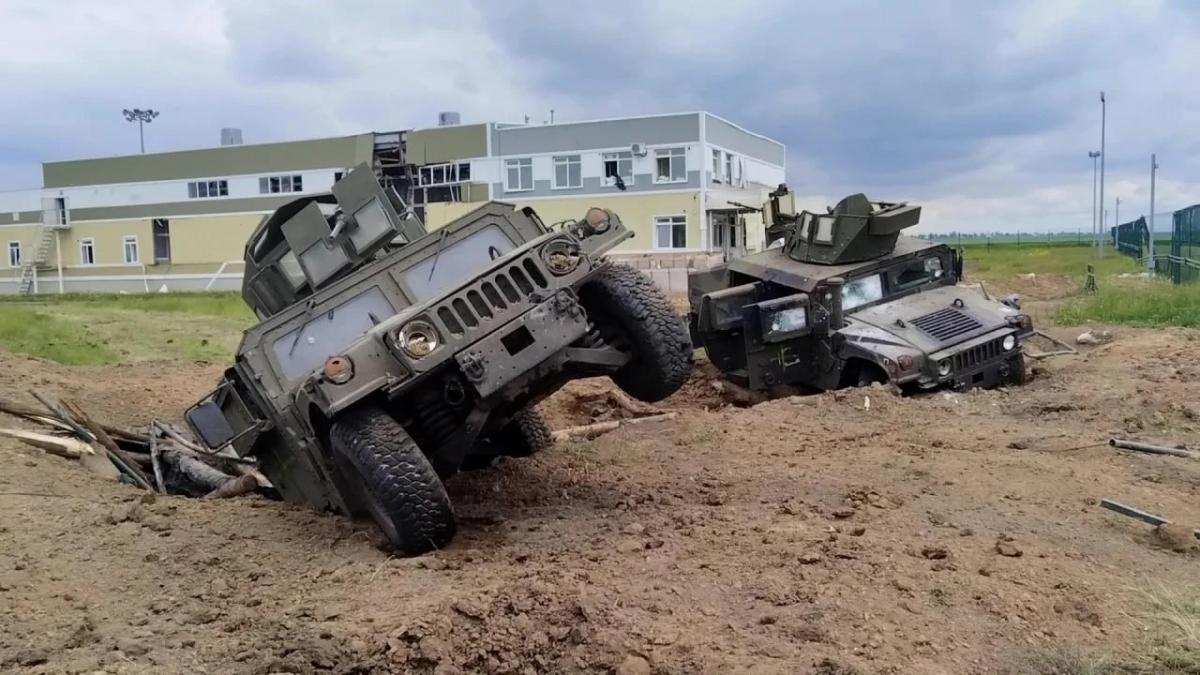May 23, 2023
1. Kiev is seeking to divert attention from the fall of Artyomovsk/Bakhmut
On May 22 after the intense shelling of Kozinka international checkpoint, as well as a number of other civilian facilities in Grayvoron District of Belgorod Region, a unit of a Ukrainian nationalist formation entered the territory of the Russian Federation. 12 civilians were injured. The news about the raid was first broken by Vyacheslav Gladkov, the region’s governor, who informed that the Russian military, the National Guard, border patrol agents and Federal Security Service have taken all the necessary measures to destroy the enemy.
The raid into this region followed a similar hit-and-run attack on Russia’s Bryansk Region in early March 2023.
The reason for this recent intrusion is: Kiev regime, considerably defeated in Artyomovsk/Bakhmut, started to carry out terrorist actions against civilians in other areas inside Russia.
The rebuff was very strong: in the course of the counter-terrorist operation, as a result of air strikes, artillery fire and active action by the units of the Western Military District that covered the state border, the nationalist formations have been blocked and pushed back into Ukraine. The remaining nationalists were attacked on the Ukrainian territory where they have been completely eliminated by a heavy fire.
The enemy losses were over 70 Ukrainian terrorists, four armored fighting vehicles and five pickup trucks.
Russian military experts urged the Government to seal all the borders with Ukraine, to distribute side arms for regular civilian patrol, to recreate the Border Troops as a separate branch of the Russian Armed Forces, and to destroy inside Ukraine all military bases of the AFU who send terrorist groups into Russian territory.
2. Putin congratulated troops on battlefield success
The Russian president has praised Wagner PMC and regular Army servicemen for completing the capture of Artyomovsk/Bakhmut. According to the MoD, the operation was completed with an assault by Wagner fighters, who had artillery and air support from regular Russian troops.
Western propaganda machine tried to create a ballyhoo over alleged ‘disagreement’ between Russian military establishment and Wagner PMC. However, the liberation of this city by joint employment of the Russian Army and Wagner fighters proved that all such stories were primitive propaganda tricks.
3. Russia criticized the USA for ‘approval’ of Ukrainian strikes on Crimea
A Ukrainian strike on Russia’s Crimean Peninsula will be regarded as seriously as an attack on any other part of the nation, Anatoly Antonov, Moscow’s ambassador to the USA, warned on May 21. He went on to warn Washington against “thoughtless judgments on Crimea, especially in terms of ‘blessing’ the Kiev regime for air attacks” on the peninsula. The envoy added that Russia will view strikes on Crimea "as an attack on any other region of the Russian Federation," and called on the US to consider potential response measures from Russia.
The White House “has never been interested in peace,” Antonov noted.
Sullivan’s remarks likewise triggered outrage from Crimean Deputy Prime Minister Georgy Muradov, who opined that by allowing Ukraine to use US-made planes to target the peninsula, the White House had “agreed to unleashing a nuclear war.”
His comments came after US National Security Advisor Jake Sullivan voiced no objections to Ukraine hitting targets in Crimea, which overwhelmingly voted to join Russia in 2014 after a Western-backed coup in Kiev aimed at entrenching a neo-Nazi regime. Speaking to CNN, Sullivan explained that “we have not placed limitations on Ukraine being able to strike on its territory…”.
4. Hungary and Germany clashed over blocked Ukraine military aid
Hungary and the FRG exchanged some verbal broadsides during a closed-door Foreign Ministers’ gathering in Brussels, a US media report stated.
Specifically, the exchange was triggered by the role of the OTP Bank (the National Savings and Commercial Bank of Hungary) in the Ukraine conflict. Hungary, which has been opposing Europe's arms supplies to the Kiev regime for prolonging the conflict, has refused to approve more EU military aid for Ukraine.
As Peter Szijjarto reiterated Budapest’s stance on the issue, his German counterpart, Foreign Minister Annalena Baerbock, is described as referencing a spate of unspecified reports.
Last month, at an EU Foreign Affairs Council meeting in Luxembourg Peter Szijjarto yet again warned that delivery of military aid to Kiev only draws out the conflagration. Hungarian Prime Minister Viktor Orban has repeatedly lambasted arms manufacturers, raking in massive profits, and Western economic circles who hope to lay their hands on Russia's rich natural resources as the ones interested in seeing the Ukraine conflict rage on.
Earlier, Budapest blocked the release of the eighth tranche of EU military aid to Ukraine worth 500 million euros ($543 million) via the European Peace Facility that has been renamed by opponents of the Ukrainian/NATO aggression against Russia as “European Aggression Facility”.
The EU has already injected more than 60 billion euros to keep up massive armed aggression of Ukraine/NATO – initially against Donbass and later versus Russia.
Written by Vladimir P. Kozin




